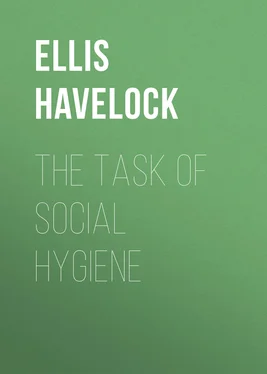Havelock Ellis - The Task of Social Hygiene
Здесь есть возможность читать онлайн «Havelock Ellis - The Task of Social Hygiene» — ознакомительный отрывок электронной книги совершенно бесплатно, а после прочтения отрывка купить полную версию. В некоторых случаях можно слушать аудио, скачать через торрент в формате fb2 и присутствует краткое содержание. Жанр: psy_sex_and_family, foreign_psychology, foreign_edu, на английском языке. Описание произведения, (предисловие) а так же отзывы посетителей доступны на портале библиотеки ЛибКат.
- Название:The Task of Social Hygiene
- Автор:
- Жанр:
- Год:неизвестен
- ISBN:нет данных
- Рейтинг книги:5 / 5. Голосов: 1
-
Избранное:Добавить в избранное
- Отзывы:
-
Ваша оценка:
- 100
- 1
- 2
- 3
- 4
- 5
The Task of Social Hygiene: краткое содержание, описание и аннотация
Предлагаем к чтению аннотацию, описание, краткое содержание или предисловие (зависит от того, что написал сам автор книги «The Task of Social Hygiene»). Если вы не нашли необходимую информацию о книге — напишите в комментариях, мы постараемся отыскать её.
The Task of Social Hygiene — читать онлайн ознакомительный отрывок
Ниже представлен текст книги, разбитый по страницам. Система сохранения места последней прочитанной страницы, позволяет с удобством читать онлайн бесплатно книгу «The Task of Social Hygiene», без необходимости каждый раз заново искать на чём Вы остановились. Поставьте закладку, и сможете в любой момент перейти на страницу, на которой закончили чтение.
Интервал:
Закладка:
Not only is feeble-mindedness inherited, and to a much greater degree than has hitherto been suspected even by expert authorities, but the feeble-minded thus tend (though, as Davenport and Weeks have found, not invariably) to have a larger number of children than normal people. That indeed, we might expect, apart altogether from the question of any innate fertility. The feeble-minded have no forethought and no self-restraint. They are not adequately capable of resisting their own impulses or the solicitations of others, and they are unable to understand adequately the motives which guide the conduct of ordinary people. The average number of children of feeble-minded people seems to be frequently about one-third more than in normal families, and is sometimes much greater. Dr. Ettie Sayer, when investigating for the London County Council the family histories of one hundred normal families and one hundred families in which mentally defective children had been found, ascertained that the families of the latter averaged 7.6 children, while in the normal families they averaged 5. Tredgold, specially investigating 150 feeble-minded cases, found that they belonged to families in which 1269 children had been born, that is to say 7.3 per family, or, counting still-born children, 8.4. Nearly two-thirds of these abnormally large families were mentally defective, many showing a tendency to disease, pauperism, criminality, or else to early death. 32 32 Feeble-mindedness and the other allied variations are not always exactly repeated in inheritance. They may be transmuted in passing from father to son, an epileptic father, for instance, having a feeble-minded child. These relationships of feeble-mindedness have been clearly brought out in an important investigation by Davenport and Weeks ( Journal of Nervous and Mental Disease , November, 1911), who have for the first time succeeded in obtaining a large number of really thorough and precise pedigrees of such cases.
Here, indeed, we have a counterbalancing influence, for, in the large families of the feeble-minded, there is a correspondingly large infantile mortality. A considerable proportion of Tredgold's group of children were born dead, and a very large number died early. Eichholz, again, found that, in one group of defective families, about sixty per cent of the children died young. That is probably an unusually high proportion, and in Eichholz's cases it seems to have been associated with very unusually large families, but the infant mortality is always very high.
This large early mortality of the offspring of the feeble-minded is, however, very far from settling the question of the disposal of the mentally defective, or we should not find families of them propagated from generation to generation. The large number who die early merely serves, roughly speaking, to reduce the size of the abnormal family to the size of a normal family, and some authorities consider that it scarcely suffices to do this, for we must remember that there is a considerable mortality even in the so-called normal family during early life. Even when there is no abnormal fertility in the defective family we may still have to recognize that, as Davenport and Weeks argue, their defectiveness is intensified by heredity. Moreover, we have to consider the social disorder and the heavy expense which accompany the large infantile mortality. Illegitimacy is frequently the result of feeble-mindedness, since feeble-minded women are peculiarly unable to resist temptation. A great number of such women are continually coming into the workhouses and giving birth to illegitimate children whom they are unable to support, and who often never become capable of supporting themselves, but in their turn tend to produce a new feeble-minded generation, more especially since the men who are attracted to these feeble-minded women are themselves—according to the generally recognized tendency of the abnormal to be attracted to the abnormal—feeble-minded or otherwise mentally defective. There is thus generated not only a heavy financial burden, but also a perpetual danger to society, and, it may well be, a serious depreciation in the quality of the community. 33 33 It may be as well to point out once more that the possibility of such limited depreciation must not be construed into the statement that there has been any general "degeneration of the race." It maybe added that the notion that the golden age lay in the past, and that our own age is degenerate is not confined to a few biometricians of to-day; it has commended itself to uncritical minds in all ages, even the greatest, as far back as we can go. Montesquieu referred to this common notion (and attempted to explain it) in his Pensées Diverses : "Men have such a bad opinion of themselves," he adds, "that they have believed not only that their minds and souls were degenerate, but even their bodies, and that they were not so tall as the men of previous ages." It is thus quite logically that we arrive at the belief that when mankind first appeared, "there were giants on the earth in those days," and that Adam lived to the age of nine hundred and thirty. Evidently no syndromes of degenerescence there!
It is not only in themselves that the feeble-minded are a burden on the present generation and a menace to future generations. In large measure they form the reservoir from which the predatory classes are recruited. This is, for instance, the case as regards prostitutes. Feeble-minded girls, of fairly high grade, may often be said to be predestined to prostitution if left to themselves, not because they are vicious, but because they are weak and have little power of resistance. They cannot properly weigh their actions against the results of their actions, and even if they are intelligent enough to do that, they are still too weak to regulate their actions accordingly. Moreover, even when, as often happens among the high-grade feeble-minded, they are quite able and willing to work, after they have lost their "respectability" by having a child, the opportunities for work become more restricted, and they drift into prostitution. It has been found that of nearly 15,000 women who passed through Magdalen Homes in England, over 2500, or more than sixteen per cent—and this is probably an under-estimate—were definitely feeble-minded. The women belonging to this feeble-minded group were known to have added 1000 illegitimate children to the population. In Germany Bonhoeffer found among 190 prostitutes who passed through a prison that 102 were hereditarily degenerate and 53 feeble-minded. This would be an over-estimate as regards average prostitutes, though the offences were no doubt usually trivial, but in any case the association between prostitution and feeble-mindedness is intimate. Everywhere, there can be no doubt, the ranks of prostitution contain a considerable proportion of women who were, at the very outset, in some slight degree feeble-minded, mentally and morally a little blunted through some taint of inheritance. 34 34 The Superintendent of a large State School for delinquent girls in America (as quoted in the Chicago Vice Commission's Report on The Social Evil in Chicago , p. 229) says: "The girls who come to us possessed of normal brain power, or not infected with venereal disease, we look upon as a prize indeed, and we seldom fail to make a woman worth while of a really normal girl, whatever her environment has been. But we have failed in numberless cases where the environment has been all right, but the girl was born wrong."
Criminality, again, is associated with feeble-mindedness in the most intimate way. Not only do criminals tend to belong to large families, but the families that produce feeble-minded offspring also produce criminals, while a certain degree of feeble-mindedness is extremely common among criminals, and the most hopeless and typical, though fortunately rare, kind of criminal, frequently termed a "moral imbecile," is nothing more than a feeble-minded person whose defect is shown not so much in his intelligence as in his feelings and his conduct. Sir H.B. Donkin, who speaks with authority on this matter, estimates that, though it is difficult to obtain the early history of the criminals who enter English prisons, about twenty per cent of them are of primarily defective mental capacity. This would mean that every year some 35,000 feeble-minded persons are sent to English prisons as "criminals." The tendency of criminals to belong to the feeble-minded class is indeed every day becoming more clearly recognized. At Pentonville, putting aside prisoners who were too mentally affected to be fit for prison discipline, eighteen per cent of the adult prisoners and forty per cent of the juvenile offenders were found to be feeble-minded. This includes only those whose defect is fairly obvious, and is not the result of methodical investigation. It is certain that such methodical inquiry would reveal a very large proportion of cases of less obvious mental defect. Thus the systematic examination of a number of delinquent children in an Industrial School showed that in seventy-five per cent cases they were defective as compared to normal children, and that their defectiveness was probably inborn. Even the possession of a considerable degree of cunning is no evidence against mental defect, but may rather be said to be a sign of it, for it shows an intelligence unable to grasp the wider relations of life, and concentrated on the gratification of petty and immediate desires. Thus it happens that the cunning of criminals is frequently associated with almost inconceivable stupidity. 35 35 See e.g. Havelock Ellis, The Criminal , 4th ed., 1910, chap IV.
Интервал:
Закладка:
Похожие книги на «The Task of Social Hygiene»
Представляем Вашему вниманию похожие книги на «The Task of Social Hygiene» списком для выбора. Мы отобрали схожую по названию и смыслу литературу в надежде предоставить читателям больше вариантов отыскать новые, интересные, ещё непрочитанные произведения.
Обсуждение, отзывы о книге «The Task of Social Hygiene» и просто собственные мнения читателей. Оставьте ваши комментарии, напишите, что Вы думаете о произведении, его смысле или главных героях. Укажите что конкретно понравилось, а что нет, и почему Вы так считаете.












